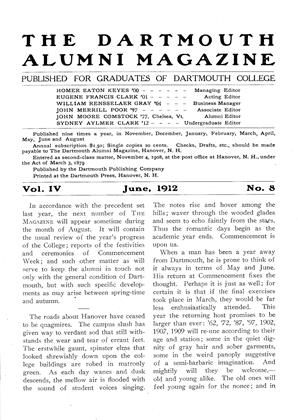Dartmouth is showing itself to be up with the times in matters of social service as well as in other departments. All over the country is sweeping a wave of unselfish interest in the welfare of "the other fellow", and the feeling has taken a thorough hold of Dartmouth undergraduates. As every Dartmouth man knows, there are country towns by the hundred in the vicinity of Hanover which are waiting and longing for just the kind of help that Dartmouth students can give without neglecting their regular curriculum and college activities. The students are recognizing this opportunity and this call to work and are accepting it. Such a statement is not the result of a moment's enthusiasm or a desire to blow a bugle for Dartmouth, but can be backed up by statistics and facts, after the statement of which we shall consider the actual nature of this social service and what results are accomplished.
This work under the name of "Deputations" has been in charge of the D. C. A., and during the past year seventy-five men have left College at different times for a few days' work in neighboring towns and preparatory schools. There have been twelve such deputation trips, , besides many minor trips. As might be expected the personnel of these different "teams" which have gone out, has been composed largely of the busiest and most promising men in all college activities. It is always the busy man who has time to do an unselfish act of service, and the majority are willing to leave their work even at great inconvenience when such a proposition of service is put up to them in the right man.ner. Several prep schools have been visited, among them Tilton, Colby, K. U. A., and Sanborn Seminary, and it is perhaps here that the best opportunity offers itself to the college man. The "paene" naturally looks up to the college man, for he is himself a college man in embryo.
In the country town, also, there is an excellent opportunity for a team of live college men to enter and set off some firecrackers under the noses of some of the soundly sleeping country towns, and most young men consider it their highest ambition to get out of the country and into the city as soon as possible.
For the sake of example and to give as definite an idea as possible of the nature' of the work, I will describe very briefly a visit made by one of the teams to Colby Academy. It serves as a good illustration of all the trips. On Friday, February 2, a team of six men left Hanover for P6tter Place, N. H., whence they had to drive eight miles to Colby Academy, arriving there about six o'clock. In the evening an informal social and musicale was held. Four of the Dartmouth men organized themeelves into an impromptu quartet and sang a variety of songs, "collegey", sentimental, "raggy", and humorous. An amateur violinist and an amateur reader were among the number and they contributed to the occasion, and in fact every member of the team was supposed to "pull off" some "stunt". Then Colby took up vaudeville and produced its leading lights, musical, oratorical, and histrionic. A few familiar songs were sung by the whole crowd, after which the evening was concluded with a very short, serious meeting, in which the object of our visit was explained and Colby's cooperation requested. By this time Colby and Dartmouth were firm friends. The friendship was strengthened next day and a little prestige added to Dartmouth through a basketball game. The Kitchen Mechanics' Union of Colby challenged the Dartmouth men to a game. A Dartmouth quintet was speedily formed, as impromptu and amateurish as the quartet, but it proved itself strong enough to beat the K. M. U. of C. A. by the score of 30 to 11.
All this time a lot of serious though quiet work was being put in with the boys, athletics and music in no way obscuring, but merely assisting in the serious purpose of the trip. Through the help of the local officers of the Colby Y. M. C. A. a canvass was made of the Colby students and as many men as possible, particularly the school leaders, were seen and talked with personally by one or another of the Dartmouth men. The object of these personal talks was to present to the boys the necessary high ideals of fairness, cleanness, and unselfishness. The religious appeal was, of course, strongly urged, though all emotionalism was studiously avoided. Through Friday, Saturday, and Sunday these personal talks and personal friendships were continued, and on Sunday, in the afternoon and evening, meetings were held to sum up and crystallize the results of the campaign
Many of the boys were very receptive, and without any feeling of emotion or high-strung sentiment, were led to devote their lives to clean, Christian living, and to do unselfish work for the other fellow, wherever they should be placed, be it in business, professional, or political life.
The plans for this extension work are being pushed for next year, when the interest bids fair to exceed even that shown during the past year.
 View Full Issue
View Full Issue
More From This Issue
-
 Article
ArticleIn accordance with the precedent set last year,
June 1912 -
 Article
ArticleSPRING MEETING OF TRUSTEES
June 1912 -
 Class Notes
Class NotesLOCAL ASSOCIATIONS
June 1912 -
 Article
ArticleTHE DARTMOUTH COLLEGE GRANT
June 1912 By Philip W. Ayres -
 Article
ArticleHOW THE HEALTH OF THE COLLEGE IS MAINTAINED
June 1912 By Howard Nelson Kings ford, D. M. C. '98 -
 Article
ArticleTHE ENGLISH TEACHERS' CONFERENCE
June 1912 By Francis Lane Childs, '06








